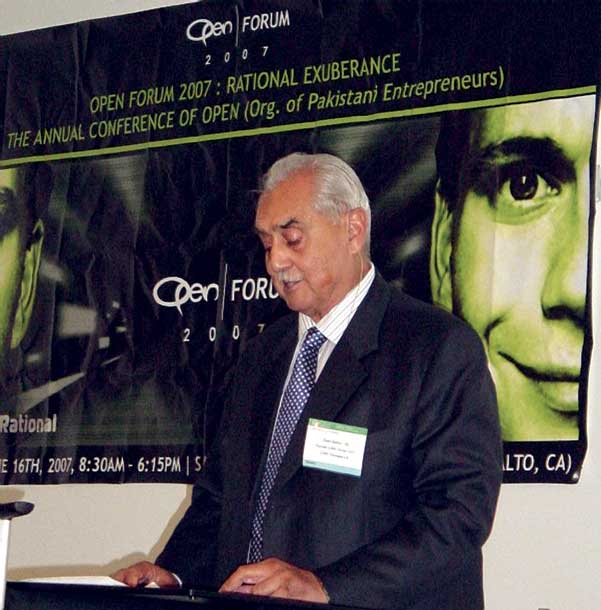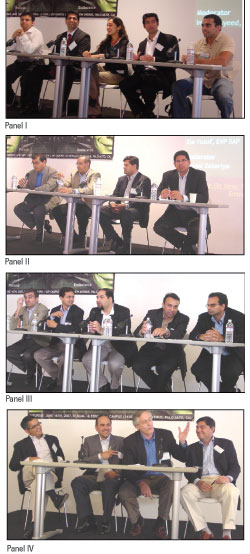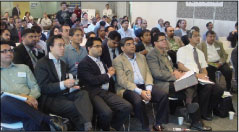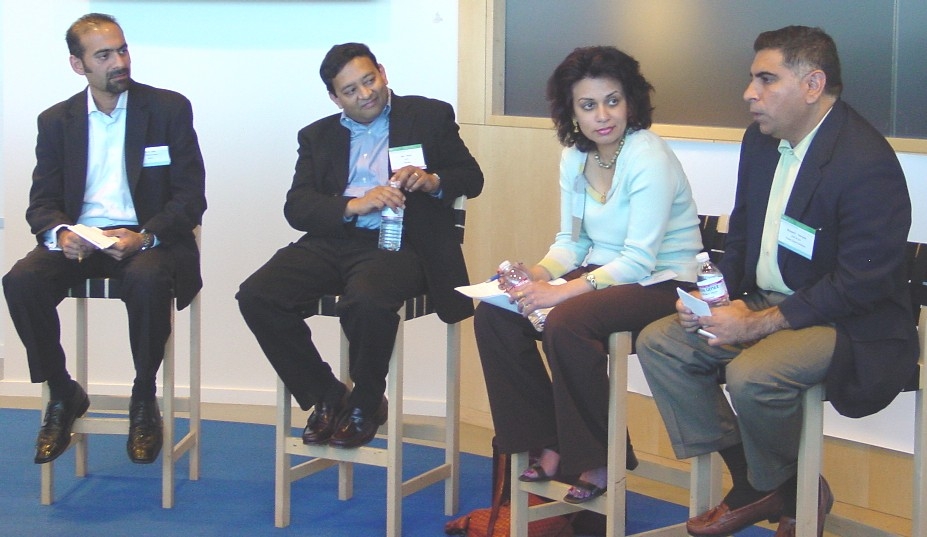Lahore to Have “Its
Own Version of Silicon Valley”
By Ras H. Siddiqui
 Syed
Babar Ali addresses the OPEN meeting in Palo Alto
Syed
Babar Ali addresses the OPEN meeting in Palo Alto |
Palo Alto, CA: The Organization
of Pakistani Entrepreneurs of North America (OPEN) Silicon
Valley Chapter (www.opensiliconvalley.com) held its fourth
annual gathering on June 16, 2007 at the SAP Headquarters
in Palo Alto, California to put to test the “Rational
Exuberance” of both the Valley hi-tech industry and
the spirit of enterprise within the Pakistani-American community
today.
This full-day affair featured three keynote speeches, four
panels and workshops each, during which approximately three
hundred people in attendance took advantage of the experience
and success of those who have already made their mark in
the world of business.
The event started off with a registration session and a
light breakfast followed by its formal opening by OPEN-SV
President Umair Khan. Umair welcomed everyone and briefly
touched on the accomplishments of the organization in the
short time that it has been around, including its growing
relationships with top notch universities such as MIT and
UC Berkeley.
Dilawar Syed next introduced the audience to the day’s
schedule and the logistical elements of this forum. He began
by introducing Professor Tom Byers, Head of the Tech Ventures
Program at Stanford University. Tom started his talk by
addressing the question “Are Entrepreneurs Born or
Made?” and took a poll on that (almost a split vote).
He presented a short introduction to the Stanford Technology
Ventures Program. “I am trying to think about now
and the future,” he said while addressing the strategic
aspects of technology funding today. He said that US venture
capital is still watching IT and Photonics, Nanotechnology,
Environment and Energy prospects today. Armed with statistics
on capital availability, Tom presented a Jeff Hawkins video
on what it takes to be an entrepreneur.  “You
have to know a little bit about everything,” it said,
and nothing could be truer in the world of business startups
today. In other words, entrepreneurship is a management
style that involves pursuing opportunity without regard
to resources currently controlled. Prof. Byers informed
that only a few universities taught entrepreneurship in
1970 but today hundreds of them are imparting knowledge
on the important subject. He shared his thoughts on what
makes a great business opportunity, a good business plan,
and necessary wisdom: “Success comes after much toil,”
he pointed out.
“You
have to know a little bit about everything,” it said,
and nothing could be truer in the world of business startups
today. In other words, entrepreneurship is a management
style that involves pursuing opportunity without regard
to resources currently controlled. Prof. Byers informed
that only a few universities taught entrepreneurship in
1970 but today hundreds of them are imparting knowledge
on the important subject. He shared his thoughts on what
makes a great business opportunity, a good business plan,
and necessary wisdom: “Success comes after much toil,”
he pointed out.
Panel 1 focusing on “Alternate Paths to Success”
consisted of Monis Rehman (CEO Naseeb Networks), Rehan Jalili
(President TSRF), Khalid Saiduddin (Founder Saafwater) and
Sophia Qureshi (News Producer Al Jazeerah). Moderated by
Imran Sayeed, this panel incorporated the thoughts of Monis,
who introduced “Halal Dating” and employment
(Rozee.com) to our community, Rehan who has been advising
American stars on how to keep their bodies fit, Khalid “Paniwaala”
who is trying to promote water cleanliness in the slums
of Karachi, and Sophia whose employer can be considered
a “problematic” career choice. Some very interesting
insights were presented here.
Workshop I which was
going on concurrently (making reporting difficult) focused
on “Doing Well by Doing Good: For Profit & Not
For-Profit Opportunities in Pakistan .” Moderated
by Aaref Hilaly, the presenters included Bilal Musharraf
(ePlanet Ventures), Ahsan Saleem (Director, The Citizens
Foundation) and Yusuf Hussain (MD, PSEB). Bilal spoke on
the giving-potential of Pakistanis, their philanthropy,
and Yusuf spoke on “Pakistan, Destination Next”
and on prioritizing human capital. Ahsan Saleem is no stranger
to us here since TCF has already established itself in this
area (thanks in part to Amjad Noorani).
Panel II featuring “Profiles in Corporate Success”
included Naseem Amin (SVP Biogen Idec), Kamal Ahmad (MD
Morgan Stanley and Zia Yusuf (EVP SAP). Moderated by Fawad
Zakaria, this panel concentrated on breaking glass ceilings
and aiming high in corporate America. Naseem said that he
never planned to do what he did today, Kamal charted out
his journey from America’s rust belt to semiconductors
and systems, and Zia talked about his experiences at the
World Bank where he also met his wife Paru (of the local
DIL Chapter) and where the two decided to give India-Pakistan
friendship a jump-start.
Workshop II held upstairs at the same time (Reporting assignments
can keep one fit too) dealt specifically with “Fundraising
for First Time Entrepreneurs.” Moderated by Waheed
Qureshi, Speakers Larry Kubal (GP Labrador Ventures), Saeed
Amidi (Amidzad Ventures), Tom Fontain (Principal Mayfield
Fund) and Naeem Zafar (Altair Ventures) reminded everyone
of the necessity of doing a thorough study of the market
and identify the need your product fills, and that investors
are bright people who cannot be convinced easily. One speaker
said that his investment company saw 4000 business plans
a year and only invested in 6 or 7. So it was best to be
precise and do ones homework before presenting a business
plan.
After lunch which turned out to be a great opportunity for
continued networking, Bill Reichert, General Partner at
Garage Ventures presented the afternoon keynote address.
Bill touched upon the prevailing wisdom for new ventures
namely 1) Come up with a disruptive technology, 2) Write
a brilliant Business Plan, 3) Raise a pile of money, 4)
Raise another pile of money, etc. 5) Go mainstream by hiring
a real CEO.
Mr. Reichert presented a better “Small is Beautiful”
alternative and his version of the “Top Ten NEW Rules
for Entrepreneurs and Investors”. Just to mention
a couple of them here, Bill said that the fundamental objective
from the point of view of the old rules was to create wealth
while from the point of view of the new rules it was create
value. For the best ways of getting started, the old rule
was to have a brilliant entrepreneur start things but the
new rule was to build a talented team. The sharing of company
vision through a Mission Statement was an old school practice
because the new rule of sharing calls for a mantra. He also
said that the focus of the old business model was on raising
capital, but the new rule focuses on raising revenues. And
one important rule that cannot be ignored today is that
the “Good old American know-how” of yesterday
has been replaced by the “Good new GLOBAL know-how,”
of today.
 |
Syed
Babar Ali with Idris Kothari and Amra Tareen |
Bill
Reichert |
Tom
Byers |
Faruq
Ahmad and Umair Khan |
Saiduddin,
Tareen and Khan |
Panel III spotlighting
“Opportunities in Global Entrepreneurship” followed
on what was to be a very busy afternoon. On the panel, Raghib
Hussain (CTO Cavium Networks), Adnan Lawai (CEO Folio3),
Faraz Hoodbhoy (CEO Pixsense), Dr. Sana Khan (CEO TrueMRI)
and Salman Akhtar (CEO Techlogix) discussed the merits and
possible demerits of going global. This panel was moderated
by Umair Khan. Here this writer has to add with pride that
Raghib, a coworker just a few years ago, is today a co-founder
of a company that has just recently had a huge IPO on NASDAQ.
All Pakistanis and especially alumni of NED in Karachi should
also be proud of him. And one cannot forget Faraz Hoodbhoy
here who continues to live up to his last name and is actually
hiring Pakistani-Americans to fill key job positions in
Pakistan. Salman Akhtar’s company might also be in
a similar hiring position.
 A section of the audience
A section of the audience
|
Workshop III focusing
on the theme “Moving to Greener Pastures” dealt
with career management. Moderated by Dilawar Syed, the panel
consisting of Bari Abdul (SVP McAffee), Mubashar Hameed
(SVP & CIO Fiserv Output Solutions), Hasan Rizvi (VP
Oracle) and Shazia Makhdumi (CEO ColorfulStories) had an
opportunity to share the wisdom that they obtained treading
their own paths to success. Shazia Makhdumi said that one
has to be careful sometimes as to what you ask for because
you just might get it (in the career context). Bari Abdul
said that “Desis do not do enough networking,”
something that many of us are becoming more aware of here
today.
After the Mid-Afternoon Networking Break, Panel IV certainly
turned out to be quite an interesting one. Three startup
business plans were presented. Mansoor Khan (DiagnosisOne),
Khalid Saiduddin (Founder Saaafwater) and Amra Tareen (CEO
Masala Inc.) made their pitch to a group of potential investors
on the panel, namely Ayaz Haque (DFJ ePlanet), Faysal Sohail
(CMEA Ventures), Ammar Hanafi (Alloy Ventures) and Bill
Reichert (Garage Ventures). Faruq Ahmad moderated this American
idol turned “Entrepreneurial Idol” segment.
Each presentation was judged on its own merits. Khalid had
the strength of social responsibility behind him as green
or environmentally conscious startups are attracting a great
deal of investment today. His pilot project in the Lyari
area of Karachi, Pakistan is a case in point. Mansoor’s
presentation was extremely professional. Armed with data
it was just a little bit on the dry side. And few could
match Amra’s energy of presentation. Out of the four
potential investors, three voted for Saafwater and one for
Masala. The audience also gave Saafwater their thumbs up,
ending the most interactive part of the day.
Workshop IV on “Healthy, Wealthy and Wise” concentrated
on both our physical and financial health. Presenters Dr.
Mobaser Rana, Imran Jaffer, Dr. Adib Ashraf and Dr. Zakia
Rahman shared their knowledge of diet, body weight, estate
planning and more with us. This workshop was a nice addition
to what is usually a technology centric forum.
Being South Asian, our risk is higher,” said Dr. Rana,
who still added that paratha avoidance in ones diet is not
necessary to lead a healthy life.

Dilawar Syed (left) with workshop
III participants |
After a word of thanks
from Umair Khan, the final keynote speaker of the day Syed
Babar Ali was introduced to a now packed hall. Speaking
on the topic “Taking the Plunge: A Personal Perspective
on Entrepreneurship, Education & Philanthropy”
the speaker had a remarkable career in all three areas to
reflect upon. He founded the Lahore Institute of Management
Sciences (LUMS) in 1985 which is the country’s premiere
management education institution today. He has also had
considerable success in commercial startups in Pakistan
including the setting up of Packages Limited, Milkpak Limited,
Tetra Pak Pakistan Limited and International General Insurance
Company Pakistan Limited (to name a few). OPEN Forum attendees
were honored to have such a distinguished speaker in their
midst.
Syed Babar Ali went through his life experiences in his
speech including the establishment of Packages Limited,
his involvement in fertilizer promotion, liquid food distribution,
his interaction with Z.A. Bhutto, General Zia, and of course
the road to the formation of LUMS. He expressed his happiness
at the large number of LUMS graduates working in both Pakistan
and North America today. “We want to do better,”
he said. “We want to establish an Engineering University,”
he added.
Taking inspiration from Thomas Friedman’s recent writings,
he went on to add that we needed to find oil in our own
backyard in Pakistan (the oil being found in human talent).
Sharing his vision of a future school of science and engineering
(SSE) attached to LUMS; he said that Pakistan could produce
technical talent that the world’s top companies would
be happy to employ. He said that initial capital for the
project has been raised and the project is scheduled to
operate an undergraduate program within five years. Organizations
such as OPEN could also help in this effort. “In ten
years Lahore will have its own version of Silicon Valley,”
said Syed Babar Ali. He said that Pakistanis worldwide are
a generous community but they do not invest in building
institutional infrastructure in the country. Here we have
an opportunity to have a school patterned on Stanford and
MIT. “We have to bring the SSE visibility to the Pakistani
Diaspora.”
To conclude here, the sponsors of this event, the OPEN Executive
Committee and the team of volunteers need to be commended
for the success of OPEN Forum 2007. It is great to see people
step away from politics and learn the ropes of cooperative
success using today’s global business model. Cavium
Networks is one such example of Pakistani-Indian-American
cooperation leading to a NASDAQ winner. Raghib Hussain,
a graduate of the Nadirshaw Edulji Dinshaw (NED) Engineering
College/University (founded by a member of the Parsi community)
in Karachi has assisted in leading his company to its global
presence today. Rational exuberance dictates that we seriously
consider helping Syed Babar Ali’s efforts to set up
the LUMS-SSE so that we can find more such success stories
in the future.
-------------------------------------------------------------------------------------

